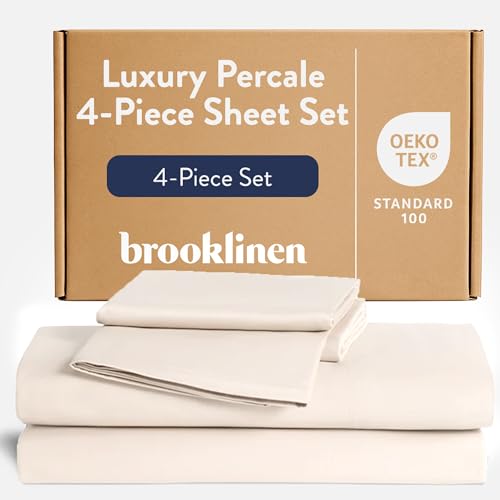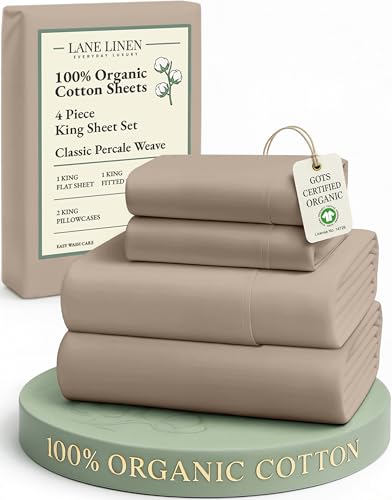Disclosure
This website is a participant in the Amazon Services LLC Associates Program, an affiliate advertising program designed to provide a means for us to earn fees by linking to Amazon.com and affiliated sites.
Introduction
Tencel sheets are typically softer, cooler, and more eco-friendly than cotton—but cotton wins when it comes to durability and affordability.
If you’ve ever found yourself standing in a bedding aisle (or scrolling online) wondering whether Tencel or cotton sheets will give you better sleep, you’re not alone. Choosing the right sheets is about more than just thread count—it’s about breathability, comfort, skin sensitivity, and even sustainability.
Here’s a quick fact to pique your interest: Tencel, made from sustainably sourced eucalyptus trees, uses 50% less water in production than traditional cotton. Yet cotton, especially high-quality types like Egyptian or Pima, has been the gold standard in bedding for centuries.
Best Sheets for Better Sleep: Our Top Picks
Choosing between Tencel and cotton sheets is easier when you know the top performers. Here are three of the best sheets—each excelling in softness, breathability, and overall comfort:
1. Sijo Lyocell Tencel Sheets
- SIJO Airyweight Sheet Awards: Made from 100% lyocell derived from organically…
- Asthma and Allergy Friendly, Oeko-Tex Class 1 Certified: Certified as Asthma and…
- Cool to the Touch & Moisture-Wicking: SIJO Airyweight sheets offer a…
- Made from 100% Tencel Lyocell fibers, offering exceptional softness and moisture-wicking properties.
- Naturally hypoallergenic, perfect for sensitive skin.
- Eco-friendly production with sustainable eucalyptus sourcing.
2. Brooklinen Classic Percale Cotton Sheets
- LUXURY PERCALE 4 PIECE SHEET SET: Cool and crisp, our Classic Percale Sheets…
- SUSTAINABLE SOFTNESS: Made from 100% long-staple cotton, these sheets are…
- THE PERFECT SHEET SET: This set includes 1 fitted, 1 flat sheet and…
- Crafted from long-staple cotton for durability and crisp, breathable comfort.
- Lightweight and ideal for hot sleepers who prefer a crisp feel.
- Durable and gets softer with every wash.
3. lane linen Organic Cotton Sheets
- Pure Organic Comfort: Experience the luxurious comfort of our Lane Linen king…
- Luxurious 4-piece bedding : Embrace luxury with our meticulously crafted 4-piece…
- Eco-Conscious Packaging: At Lane Linen, we are committed to sustainability. Our…
- Made from 100% Egyptian cotton with a sateen weave for a smooth, luxurious feel.
- Balances softness with strong durability.
- Trusted brand with transparent sourcing and quality control.
What Is Tencel and How Is It Made?
Tencel is a branded form of lyocell, a type of rayon made from wood pulp, primarily eucalyptus trees. Its production process is what sets it apart from traditional fabrics, combining sustainability with comfort.
How Tencel Is Made:
- Sustainable Sourcing: Eucalyptus trees used for Tencel are grown in sustainably managed forests, requiring minimal water and no pesticides.
- Closed-Loop Process: The wood pulp is dissolved using a non-toxic solvent, and almost all chemicals used are recycled, reducing environmental impact.
- Fiber Production: The dissolved pulp is spun into fibers, then woven into soft, smooth fabric with excellent moisture management.
Key Features of Tencel:
- Softness: Tencel fibers have a smooth surface, making them silky to the touch and less prone to irritation.
- Breathability: The fabric efficiently absorbs moisture and releases it, keeping sleepers cool and dry.
- Hypoallergenic: Naturally resistant to dust mites and bacteria, it’s ideal for allergy sufferers.
- Eco-Friendly: Requires less water and chemicals than cotton, making it a greener choice for bedding.
The Pros and Cons of Cotton Sheets
Cotton sheets have been a staple in bedding for centuries, prized for their natural comfort and durability. However, like any fabric, cotton has both advantages and drawbacks that affect how well it performs for different sleepers.
Pros of Cotton Sheets:
- Softness: High-quality cotton (like Egyptian or Pima) is naturally soft and gets even softer with every wash.
- Breathability: Cotton allows air to circulate well, making it a good choice for warm sleepers.
- Durability: Long-staple cotton fibers create strong, long-lasting sheets that withstand frequent washing.
- Wide Availability: Cotton sheets come in a variety of weaves, thread counts, and price points, so you can find options for every budget.
- Natural and Hypoallergenic: Being a natural fiber, cotton is generally safe for sensitive skin and less likely to cause irritation.
Cons of Cotton Sheets:
- Water-Intensive Production: Growing cotton requires significant water and pesticide use, raising sustainability concerns.
- Wrinkling: Cotton sheets tend to wrinkle easily unless they’re treated with chemicals or blended with synthetic fibers.
- Moisture Retention: Cotton absorbs moisture but doesn’t wick it away as efficiently as Tencel, which can leave you feeling damp if you sweat.
- Longer Drying Time: Cotton can take longer to dry after washing, which might be inconvenient.
Comparing Comfort: Tencel vs. Cotton Feel and Breathability
When choosing between Tencel and cotton sheets, comfort is often the deciding factor. Both fabrics offer unique textures and cooling properties that affect your sleep quality.
Feel and Texture
- Tencel:
- Silky smooth and luxuriously soft, often compared to silk or satin.
- Has a gentle sheen and feels cool against the skin, making it ideal for those with sensitive or dry skin.
- Lightweight with a slightly fluid drape, giving a modern, elegant look.
- Cotton:
- Varies by weave—percale feels crisp and cool, while sateen is smooth and silky.
- Feels more natural and breathable but can be rougher initially depending on quality.
- Becomes softer over time with washing, especially high-quality long-staple cotton.
Breathability and Temperature Regulation
- Tencel:
- Highly breathable and excels at moisture-wicking, absorbing sweat and releasing it quickly.
- Helps regulate body temperature, keeping you cool in summer and warm in winter.
- Naturally resistant to bacterial growth, reducing odors.
- Cotton:
- Breathable and good at allowing air flow, particularly in percale weave.
- Absorbs moisture but does not dry as quickly as Tencel, which can sometimes trap heat.
- Less effective at moisture management, which might not suit hot sleepers or those who sweat at night.
Which One Feels Better?
- If you prefer silky softness and superior moisture control, Tencel is the clear winner.
- For those who love the classic, breathable feel of natural fibers and want durability, cotton remains a solid choice.
Durability and Care: How Long Do They Last?
Understanding how long your sheets last and how to care for them can help you get the best value and maintain comfort over time.
Durability of Tencel Sheets
- Strength: Tencel fibers are strong but can be more delicate than cotton, especially if exposed to harsh washing conditions.
- Pilling: Less prone to pilling due to the smooth fiber surface.
- Lifespan: Typically lasts around 3–5 years with proper care.
- Care Tips:
- Wash on a gentle cycle with cold water to prevent damage.
- Avoid bleach and fabric softeners, which can weaken fibers.
- Air drying or low heat tumble drying is recommended to maintain fabric integrity.
Durability of Cotton Sheets
- Strength: High-quality cotton, especially long-staple varieties, is known for excellent durability.
- Pilling: Cotton can pill over time, especially if lower quality or washed improperly.
- Lifespan: Can last 5–10 years, often longer with good care.
- Care Tips:
- Wash in warm water to clean thoroughly but avoid high heat to prevent shrinkage.
- Use mild detergent and avoid excessive bleach.
- Tumble dry on low or medium heat, removing sheets promptly to reduce wrinkles.
Which Sheets Are More Sustainable?
Sustainability is a growing concern when choosing bedding, and both Tencel and cotton have distinct environmental impacts.
Sustainability of Tencel Sheets
- Raw Materials: Made from sustainably harvested eucalyptus, beech, or oak trees, which grow quickly and require less water.
- Water Usage: Requires about 10 times less water to produce compared to traditional cotton.
- Chemical Use: Uses a closed-loop solvent spinning process, recycling nearly 99% of chemicals, minimizing waste and pollution.
- Biodegradability: Fully biodegradable and compostable at the end of its life cycle.
- Certifications: Often certified by environmental organizations like OEKO-TEX and FSC (Forest Stewardship Council).
Sustainability of Cotton Sheets
- Raw Materials: Cotton is a natural fiber but heavily reliant on water and pesticides, especially conventional cotton.
- Water Usage: Cotton farming consumes significant amounts of water — approximately 20,000 liters per kilogram of cotton.
- Chemical Use: Conventional cotton uses pesticides and fertilizers that can harm soil and waterways. Organic cotton avoids these but is less widely available and more expensive.
- Biodegradability: Fully biodegradable and compostable.
- Certifications: Organic cotton often carries GOTS (Global Organic Textile Standard) certification, ensuring environmental and social standards.
Conclusion
Choosing between Tencel and cotton sheets comes down to your personal priorities, whether that’s comfort, durability, or sustainability.
Key Takeaways:
- Comfort: Tencel offers a silky, cool feel perfect for sensitive skin and hot sleepers. Cotton provides classic breathability and gets softer with age.
- Durability: Cotton sheets generally last longer, especially high-quality varieties, while Tencel requires gentler care but remains strong when treated properly.
- Sustainability: Tencel stands out as the greener option thanks to its eco-friendly production process, though organic cotton can also be a responsible choice.
Frequently Asked Questions About Tencel vs. Cotton Sheets
Are Tencel sheets better for hot sleepers?
- Yes, Tencel sheets are highly breathable and excel at moisture-wicking.
- They quickly absorb and release sweat, helping to regulate body temperature.
- This makes them an excellent choice for people who tend to sleep hot or sweat during the night.
How do Tencel sheets compare to cotton in softness?
- Tencel has a smoother, silkier feel due to its fiber structure.
- Cotton softness varies by type and weave, with Egyptian and Pima cotton being very soft.
- Both become softer with washing, but Tencel typically feels silky from the first use.
Are cotton sheets easier to care for than Tencel?
- Cotton sheets are generally more durable and can handle higher washing temperatures.
- Tencel requires gentler care, such as washing in cold water and avoiding harsh detergents or bleach.
- Proper care extends the life of both fabrics but cotton is more forgiving.
Which sheets are more sustainable: Tencel or cotton?
- Tencel is more sustainable due to its low water usage and closed-loop chemical process.
- Conventional cotton uses more water and pesticides, but organic cotton is a greener alternative.
- Choosing certified organic or OEKO-TEX products enhances sustainability.
Do Tencel sheets work well for people with sensitive skin?
- Yes, Tencel is naturally hypoallergenic and smooth, reducing irritation.
- Cotton, especially organic, is also gentle but can sometimes feel rougher initially.
- Both fabrics are good options, but Tencel may be preferable for highly sensitive skin.
How long do Tencel and cotton sheets typically last?
- Cotton sheets can last 5 to 10 years or more with proper care.
- Tencel sheets usually last around 3 to 5 years and need more delicate handling.
- Lifespan depends heavily on quality and washing practices.



